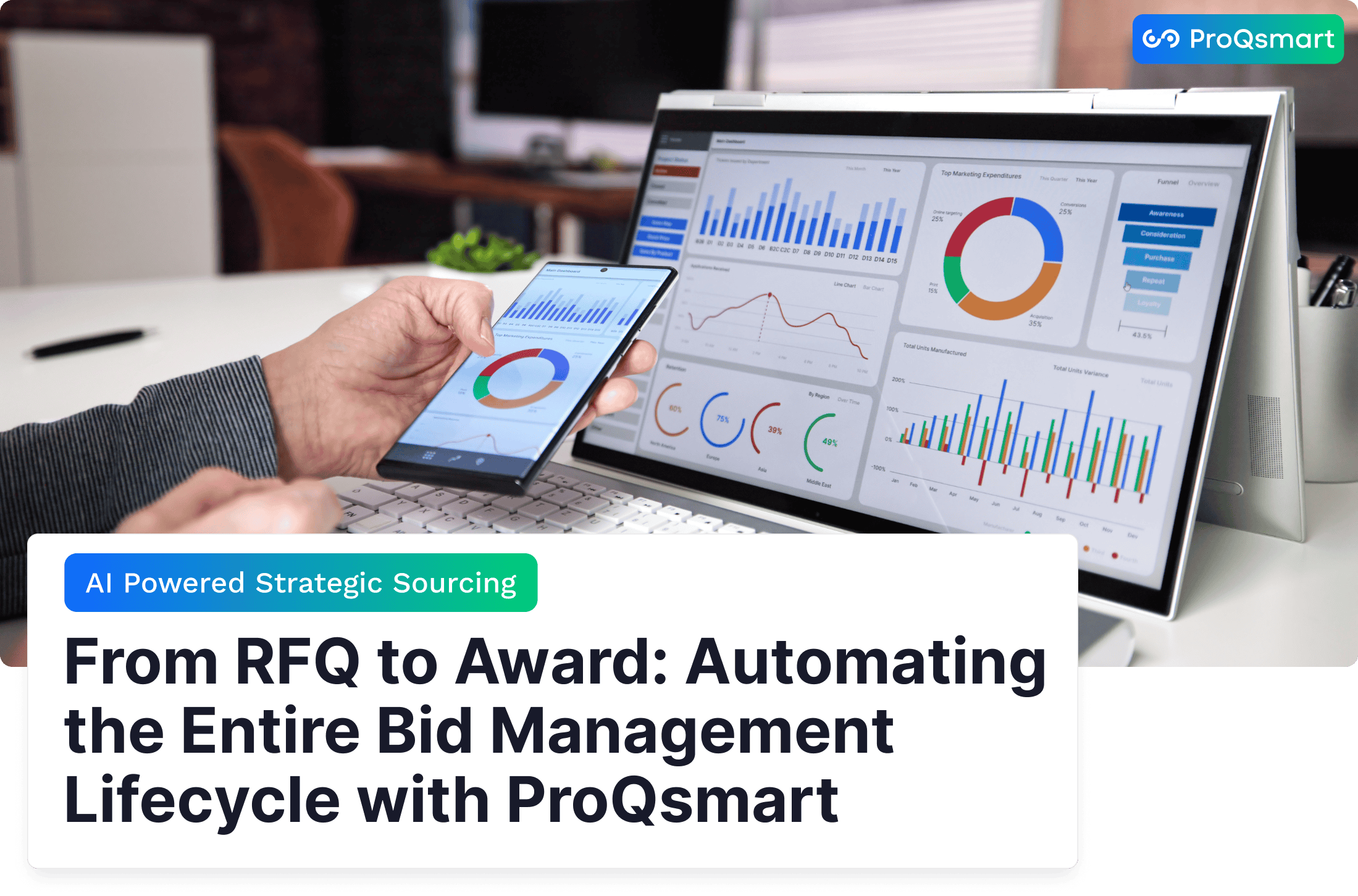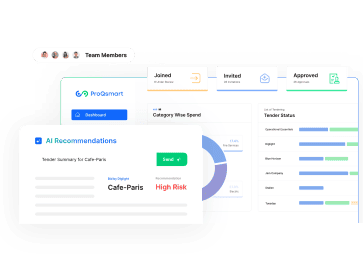Bid management is the organized process of overseeing and coordinating proposals for procurement or project contracts to ensure efficiency and compliance. It involves evaluating requirements, preparing detailed documentation, and managing submissions within specified deadlines.
A well-structured bid management strategy helps businesses secure contracts by aligning proposals with client expectations while maintaining cost-effectiveness. From assessing eligibility criteria to negotiating terms, every stage plays a critical role in achieving successful outcomes.
Effective bid management not only improves win rates but enhances supplier relationships and operational transparency. By adopting streamlined workflows and leveraging digital tools, organizations can simplify complex bidding processes and gain a competitive edge.
In this article, we explore actionable strategies to optimize bid management for superior results.
Why Bid Management is Important in Procurement?
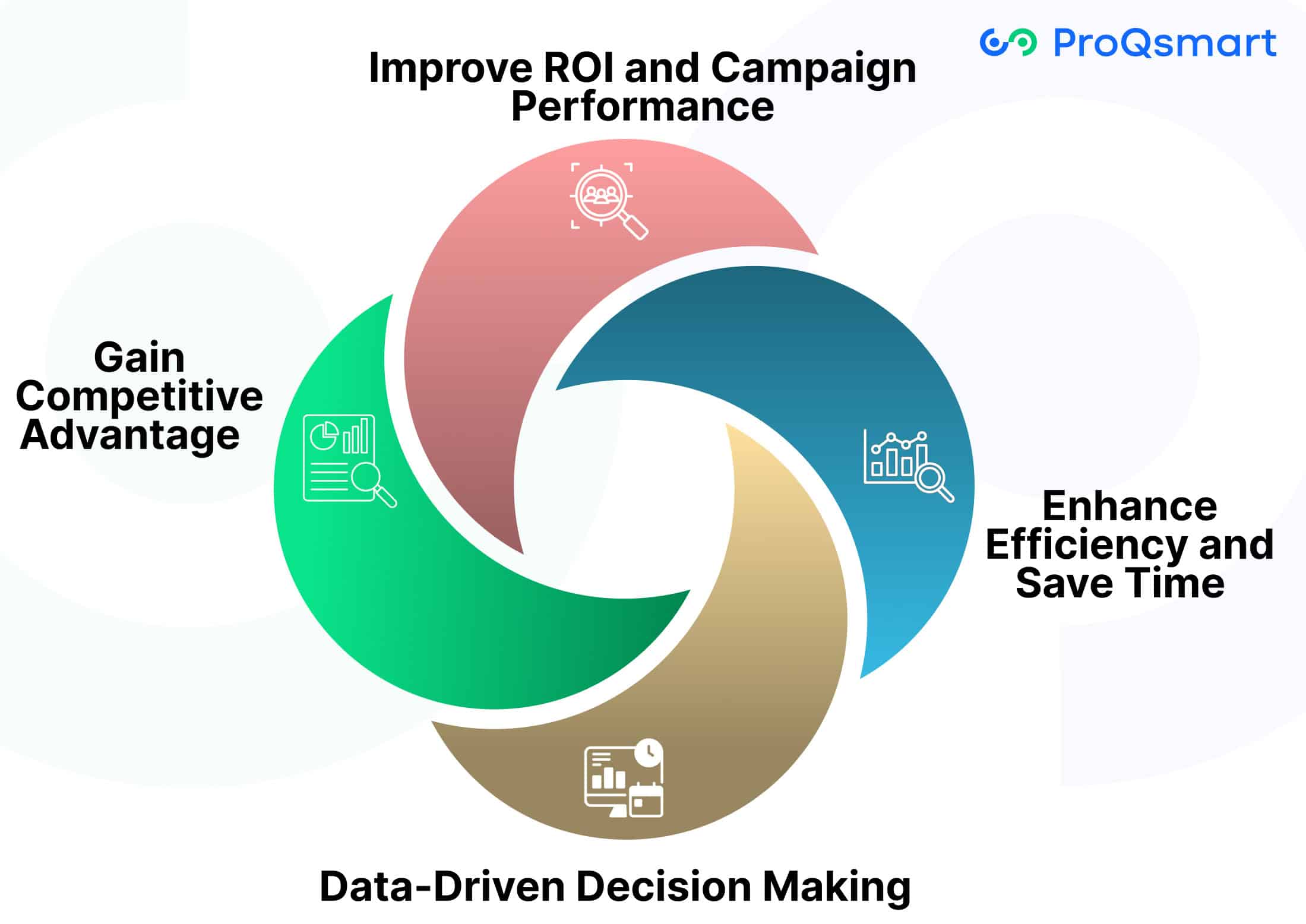
Bid management plays a crucial role in bid process management, helping procurement professionals focus on strategies that support broader business objectives. Specifically, it aids in achieving the best price and quality through creating more structured interactions with suppliers, thereby enhancing the competitive bidding process.
Additionally, a well-managed bidding process allows teams to evaluate options effectively, securing contracts that meet both budgetary constraints and quality expectations. For instance, by analyzing supplier proposals side-by-side, procurement teams can identify the best value without compromising performance, ultimately optimizing cost savings and operational efficiency in the bid process.
Efficient bid management significantly impacts procurement cycle times, enabling projects to commence and progress more swiftly. Besides, by adopting templates, checklists, and automated solutions such as ProQsmart’s bid management tool, organizations can eliminate duplications in document management and streamline their workflows.
Better transparency and better compliance with applicable laws and regulations are two critical outcomes of a robust bid management process. Utilizing platforms like ProQsmart ensures auditable sourcing data, real-time collaboration, and supplier performance monitoring, which simplifies adherence to regulatory standards.
Improve ROI and Campaign Performance
ROI is maximized with a laser-focused bidding effort that waits for and targets the best opportunities they can realistically pursue. Moreover, monitoring relevant KPIs, including savings achieved and contract award success rates, allows for continuous improvement of techniques.
Ongoing evaluation of bid performance, enabled by data analytic platforms, makes campaigns even smarter and more effective.
Enhance Efficiency and Save Time
Today’s estimating software aids in minimizing bid preparation time, but effective communication between internal teams is crucial for successful bids. ProQsmart’s automated workflows and bid process management tools significantly enhance team collaboration in this endeavor.
Data-Driven Decision Making
Modern bid strategies should be guided by data analytics, which leverages a mix of historical trends and competitor insights. Besides, by utilizing a dedicated bid management solution like ProQsmart’s AI-driven platform, bid managers can achieve greater accuracy in data interpretation and more actionable outcomes.
Gain Competitive Advantage
Developing unique selling propositions and being aware of current market trends helps your bids stand out in the bid management process. Continuous improvement, made possible through ProQsmart’s real-time collaboration, enhances bid process management, keeping you ahead of the competition.
RFQs Role in Bid Management
Request for Quotations (RFQs) play an important role in the bid management journey. They offer a formalized process to collect in-depth pricing from qualified bidders. As part of the bid solicitation phase, alongside RFPs, IFBs, and other tendering methods, RFQs provide a clear framework for communicating project needs and expectations.
They articulate precise needs to reduce the chances of mistakes or lapses. This plan keeps bids submitted days ahead of bid deadlines. This is especially important in capital intensive industries such as construction, where serial tendering typically means similar tendering with repeat cycles or bills of quantities.
RFQ Process Explained
The RFQ process starts with creating an RFQ document that details the project requirements, schedule, and expected deliverables. Defining these requirements is very important, since vague RFQs often result in off-target vendor replies.
Then comes distribution, which is increasingly being done with the support of cloud-based bid management platforms, such as ProQsmart. ProQsmart delivers increased transparency and compliance, helping to meet regulatory requirements during each stage of the process.
Vendor evaluation criteria play a significant role in RFQs, allowing buyers to assess technical capabilities, experience, and pricing. Timely follow-ups with suppliers post-distribution ensure all queries are addressed, further refining the accuracy of submissions.
For instance, ProQsmart’s supplier performance monitoring tools enable ongoing assessments, fostering stronger supplier relationships and delivering value across procurement cycles.
How RFQs Improve Bid Quality
RFQs make certain that bidders are very clear on project requirements, resulting in more competitive pricing and more complete proposals. When RFQs are detailed it forces the firm to be clear about deliverables, preventing miscommunication and ensuring a more polished bid.
Companies that leverage ProQsmart have been winning jobs at a higher rate. The tool’s sophisticated features improve collaboration and bring procurement in line with overall financial goals.
How to Optimize Bid Management?
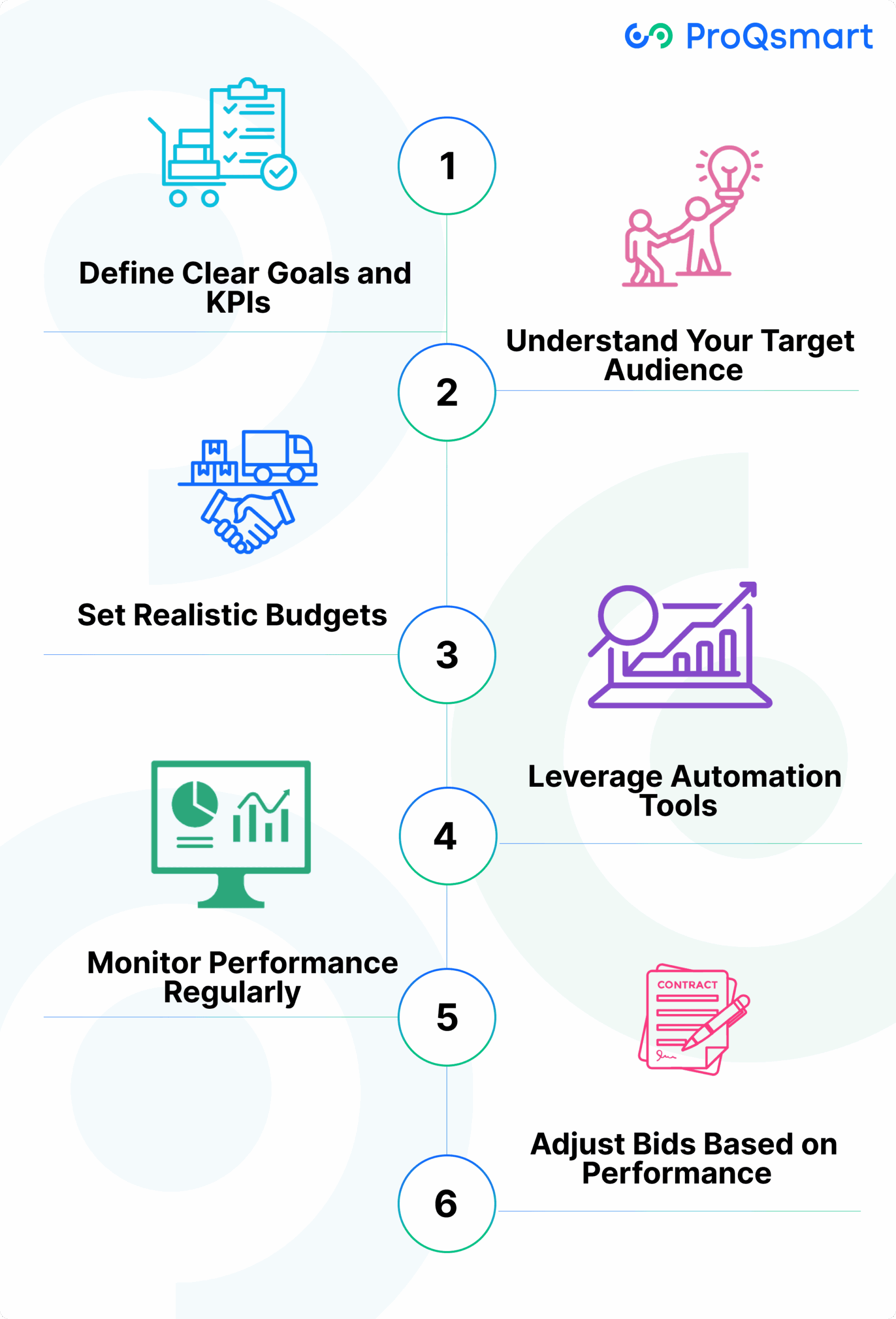
Optimizing bid management involves a strategic and data-driven approach to ensure your bids are competitive, effective, and well-aligned with your business goals. By focusing on bid process management, you can optimize your resources and improve the overall effectiveness of your bids.
1. Define Clear Goals and KPIs
Establishing clear, specific, and measurable objectives is key to informing your bid management approach. Start by determining what success looks like for each bid. This might mean winning a specific contract, reaching the desired ROI, or increasing market share.
Measure results using KPIs like win rates, average value of a bid, or cost-per-click efficiency. Set these goals within the context of your organization’s overall objectives so that each bid contributes positively to future growth.
Continuously reassess and adjust targets to account for shifts in market landscape or client expectations.
2. Understand Your Target Audience
The key to custom tailoring your proposals is knowing your client’s needs and preferences inside and out. Understand their pain points, objectives, and processes so you can align with them.
Using buyer personas, you can also develop proposals that hit home, illustrating how your solution meets their needs and overcomes their obstacles. For instance, focus on unique features of your product that address challenges unique to the industry, while indirectly pointing out how you solve them better than competitors.
3. Set Realistic Budgets
A realistic budget goes hand in hand with the new project’s reality. Consider all overhead, including manpower, material, and possible contingencies.
Don’t underestimate costs to stay competitive while still protecting your bottom line. ProQsmart, for instance, provides real-time budget tracking, helping organizations keep procurement in line with financial objectives.
4. Leverage Automation Tools
Bid management software helps contractors by simplifying their processes through automation of repetitive tasks. Tools such as ProQsmart allow e-tendering, document management, and collaboration to happen in real-time.
Automation minimizes the risk of manual errors, streamlines workflows, and improves overall efficiency, making automation key for large-scale and complex bids.
5. Monitor Performance Regularly
Continuous performance monitoring and reporting help tell the story of what’s working and what’s not. Monitor your performance on key metrics such as your bid success rates, ROI and listen to client feedback.
This data informs adjustments and helps you refine strategies, ensuring continuous improvement.
6. Adjust Bids Based on Performance
Agility is essential in bid management. Utilize real-time analytics to pinpoint areas of underperformance and strategically increase or decrease bids.
Things like incremental cost-per-click increases or multi-channel attribution models allow for a more de-duplicated allocation of resources. By prioritizing high-win-rate opportunities, you’ll position your company for maximum success.
Manual vs. Automated Bid Management
|
Aspect |
Manual Bid Management |
Automated Bid Management with ProQsmart |
|---|---|---|
|
Control |
Ultimate control over bids at granular levels. Useful for high-priority campaigns requiring precision and immediate adjustments. |
Automated workflows reduce manual effort, maintaining competitive positioning while requiring oversight for campaign goals and performance monitoring. |
|
Efficiency |
Time-consuming, frequent attention and adjustments needed. |
Streamlines processes, significantly reducing manual effort and enhancing efficiency. |
|
Accuracy |
Prone to human errors such as calculation mistakes and document inconsistencies. |
Minimizes errors through automation, ensuring consistency and compliance. |
|
Collaboration |
Limited real-time collaboration capabilities. |
Enhances collaboration through real-time communication and shared access to bid documents. |
|
Compliance |
Manually tracked compliance, prone to errors. |
Ensures regulatory adherence through built-in compliance management features. |
|
Scalability |
Difficult to manage multiple bids simultaneously. |
Easily manages multiple projects and tracks bids in real-time. |
|
Decision-Making |
Decisions based on manual analysis and historical data. |
Data-driven insights and AI-driven analytics support informed decision-making. |
Advanced Bid Management Tools
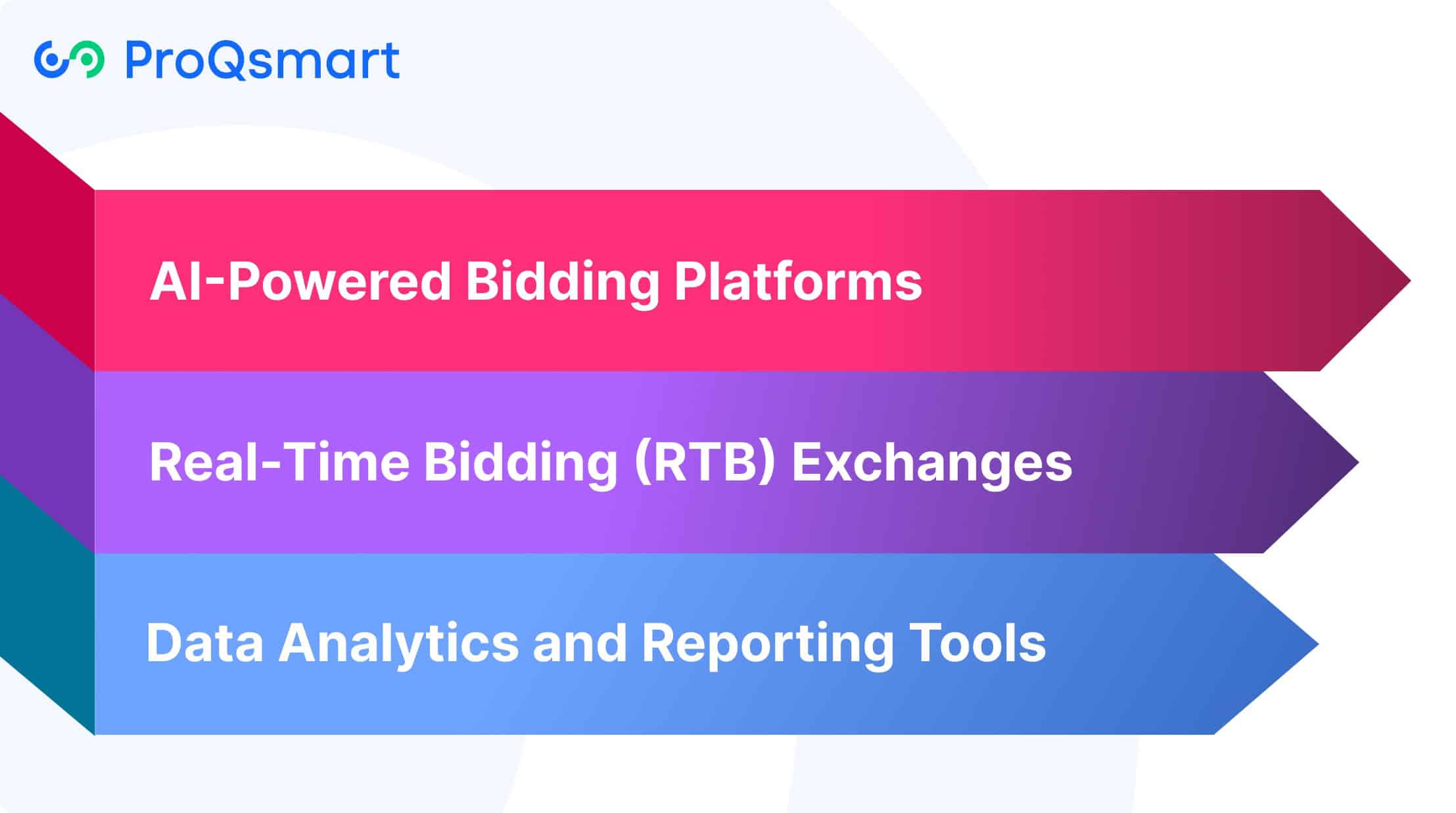
Advanced bid management tools have quickly changed the game on how procurement professionals can manage these complicated bidding processes, enabling efficiency, accuracy, and improved decision-making.
These new tools are powered by AI and automation. They reduce manual effort and provide critical insights to streamline operations and achieve key business objectives.
AI-Powered Bidding Platforms
Advanced AI bidding platforms capabilities are staggering. They improve supplier transparency through AI-supported data analysis, ensuring compliance with inclusion metrics and project needs.
ProQsmart’s powerful algorithms do more, much more. They track down opportunities, tailor submissions to specific timelines and search tender documents for pertinent keywords.
Automated bid evaluations remove errors from manual processes guaranteeing that bids are compared fairly and accurately. For acquisitions and procurement leaders, this means more trusted decisions driven by analytics.
When you’re choosing these platforms, look for ease of customization, integration with your existing systems and user-friendliness. These four elements will help guarantee the platforms you adopt fulfill your long-term procurement requirements.
Real-Time Bidding (RTB) Exchanges
By contrasting every active offer, RTB exchanges make procurement more transparent and promote quicker decision-making.
Combined with greater targeting capabilities and the ability to monitor and adjust campaigns in real-time, they increase ROI and minimize waste.
Issues such as complexity of monitoring, risk of fraud, and need for continual optimization should be weighed.
Data Analytics and Reporting Tools
ProQsmart’s data analytics features, including customizable dashboards and real-time reporting, empower procurement teams to analyze vendor performance, track bid success rates, and discover cost-saving opportunities.
Automated reporting reduces time spent and improves accuracy, allowing teams to focus on achieving strategic objectives.
Centralized data makes it simple to pull in historical insights, speeding up the process of preparing future bids.
Conclusion
Effective bid management is crucial for equipping your team to make better decisions and foster more resilient supplier relationships. It ensures you secure the best-qualified vendors, save money, and maintain a competitive edge. Leveraging advanced tools and automated systems accelerates the process while improving accuracy, saving time, and reducing costly errors. While manual tools may suffice for smaller initiatives, scaling requires intelligent, hands-free solutions that are more strategic and solution-focused.
Staying ahead of the competition involves embracing innovative strategies and tools to keep processes streamlined and open. Bid management is more than just selecting the cheapest bid; it’s about value, quality, and meeting business needs.
To elevate your bid management to the next level, consider integrating cutting-edge technology that enhances efficiency, collaboration, and decision-making. ProQsmart offers a comprehensive platform designed to streamline and automate the bid management process, ensuring you achieve greater results with certainty.
Ready to transform your bid management processes? Book a ProQsmart demo today!

